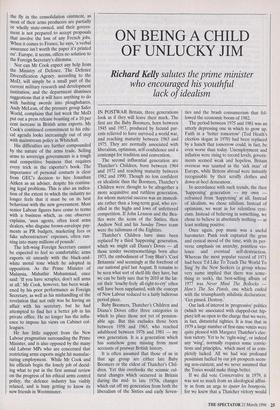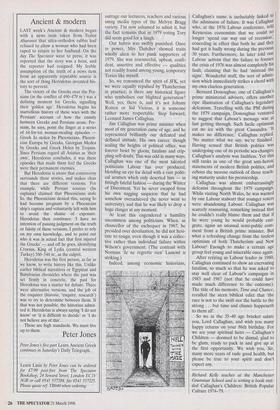ON BEING A CHILD OF UNLUCKY JIM
Richard Kelly salutes the prime minister
who encouraged his youthful lack of idealism
IN POSTWAR Britain, three generations look as if they will leave their mark. The first are the Baby Boomers, born between 1945 and 1957, produced by fecund par- ents relieved to have survived a world war, and reaching maturity between 1963 and 1975. They are normally associated with liberalism, optimism, self-confidence and a contempt for tradition and convention.
The second influential generation are Thatcher's Children, born between 1964 and 1972 and reaching maturity between 1982 and 1990. Though no less confident or idealistic than the Boomers, Thatcher's Children were thought to be altogether a more acquisitive and ruthless generation, for whom material success was an immedi- ate rather than a long-term goal, who rev- elled in the highs and lows of unfettered competition. If John Lennon and the Bea- tles were the icons of the Sixties, then Andrew Neil and his Sunday Times team were the talismans of the Eighties.
Thatcher's Children have since been replaced by a third `happening' generation, which we might call Diana's Doves — all those tender twentysomethings born after 1973, the embodiment of Tony Blair's `Cool Britannia' and seemingly at the forefront of our national grief last August. It remains to be seen what sort of shelf-life they have, but we can be fairly sure that by 2010 at the lat- est their `touchy-feely all-right-to-cry' ethos will have been supplanted, with the concept of New Labour reduced to a fairly ludicrous period piece.
Baby Boomers, Thatcher's Children and Diana's Doves offer three categories in which to place those not yet of pension- able age. But this excludes those born between 1958 and 1963, who reached adulthood between 1976 and 1981 — my own generation. It is a generation which has somehow gone missing from most accounts of postwar British history.
It is often assumed that those of us in that age group are either late Baby Boomers or the eldest of Thatcher's Chil- dren. Yet this overlooks the seismic cul- tural changes which occurred in Britain during the mid- to late 1970s, changes which cut off my generation from both the liberalism of the Sixties and early Seven- ties and the brash consumerism that fol- lowed the economic boom of 1982.
The period between 1975 and 1981 was an utterly depressing one in which to grow up. Faith in a `better tomorrow' (Ted Heath's election slogan in 1970) had been replaced by a hunch that tomorrow could, in fact, be even worse than today. Unemployment and inflation were rising to record levels, govern- ments seemed weak and hopeless, Britain overseas was taunted as the `sick man' of Europe, while Britons abroad were instantly recognisable by their scruffy clothes and down-at-heel demeanour.
In accordance with such trends, the then `happening' generation — my own refrained from 'happening' at all. Instead of idealism, we chose nihilism. Instead of optimism, we went in for relentless cyni- cism. Instead of believing in something, we chose to believe in absolutely nothing — at least nothing positive.
Once again, pop music was a useful barometer, Punk rock captured the grim and cynical mood of the time, with its per- verse emphasis on anarchy, pointless vio- lence and eventual self-destruction. Whereas the most popular record of 1971 had been 'I'd Like To Teach The World To Sing' by the New Seekers (a group whose very name implied that there was some- thing to seek), the best-selling album of 1977 was Never Mind The Bollocks — Here's The Sex Pistols, one which ended with the triumphantly nihilistic declaration: `Get pissed. Destroy.'
Our lack of interest in 'progressive' politics (which we associated with clapped-out hip- pies) left us open to the charge that we were, in fact, distasteful righties. It is true that in 1979 a large number of first-time voters were quite pleased with Margaret Thatcher's elec- tion victory. Yet to be `right-wing', or indeed any 'wing', normally requires some convic- tions and principles, which most of us com- pletely lacked. All we had was profound pessimism fuelled by our job prospects seem- ing non-existent; and we never assumed that the Tories would make things better.
If we did vote Conservative in 1979, it was not so much from an ideological affini- ty as from an urge to epater les bourgeois, for we knew that a Thatcher victory would outrage our lecturers, teachers and various smug media types of the Melvyn Bragg variety. I'm now ashamed to admit it, but the fact remains that in 1979 voting Tory did seem good for a laugh.
Our hubris was swiftly punished. Once in power, Mrs Thatcher showed traits wholly alien to her punk supporters of 1979. She was resourceful, upbeat, confi- dent, assertive and effective — qualities not readily found among young, temporary Tories like myself.
So, we renounced the spirit of JFK, yet we were equally repulsed by Thatcherism in practice; is there any historical figure who symbolises our blighted generation? Well, yes, there is, and it's not Johnny Rotten or Sid Vicious, it is someone rather more respectable. Step forward, Leonard James Callaghan.
Jim Callaghan was prime minister when most of my generation came of age, and he represented brilliantly our defeated and deflated attitude. His own career, though scaling the heights of political office, was forever beset by gloom, fatalism and crip- pling self-doubt. This was odd in many ways. Callaghan was one of the most talented politicians Labour has ever produced, blending an eye for detail with a rare politi- cal acumen which only deserted him — in fittingly fateful fashion — during the Winter of Discontent. Yet he never escaped from his own nagging suspicion that he had somehow overachieved (he never went to university), and that he was likely to drop a huge danger at any moment.
At least this engendered a humility uncommon among politicians. When, as chancellor of the exchequer in 1967, he presided over devaluation, he did not hesi- tate to resign, even though it was a collec- tive rather than individual failure within Wilson's government. (The contrast with Norman `Je ne regrette rien' Lamont is striking.) Indeed, among economic historians, Callaghan's name is ineluctably linked to the admission of failure. It was Callaghan who, at the 1976 Labour conference, told Keynesian economists that we could no longer 'spend our way out of recession', conceding in effect that both he and they had got it badly wrong during the previous 30 years. Furthermore, he later told one Labour activist that the failure to foresee the crisis of 1976 was almost completely his fault, claiming that he had 'misread the signs'. Wonderful stuff, the sort of admis- sion which immediately strikes a chord with my own clueless generation. Bernard Donoughue, one of Callaghan's prime ministerial advisers, offers another ripe illustration of Callaghan's legendary defeatism. Travelling with the PM during the 1979 campaign, Donoughue ventured to suggest that Labour's message was at last getting through. Such facile optimism cut no ice with the great Cassandra. 'It makes no difference,' Callaghan replied. 'No matter what we say, we're finished.' Having sensed that British politics was undergoing one of its periodic sea-changes, Callaghan's analysis was faultless. Yet this still ranks as one of the great anti-heroic statements of modern British politics, and echoes the morose outlook of those reach- ing maturity under his premiership.
Callaghan was almost embarrassingly defeatist throughout the 1979 campaign. While visiting North Wales, he was warned by one Labour stalwart that younger voters were abandoning Labour. Callaghan was scarcely reassuring, remarking instead that he couldn't really blame them and that if he were young he would probably emi- grate, again an unusual semi-public com- ment from a British prime minister. But what a refreshing change from the tireless optimism of both Thatcherism and New Labour! Enough to make a certain age group feel young and miserable once again.
After retiring as Labour leader in 1980, Callaghan continued to show an enervating fatalism, so much so that he was asked to stay well clear of Labour's campaigns in 1983 and 1987 (not that he could have made much difference to the outcome). The title of his memoirs, Time and Chance, recalled the stern biblical edict that 'the race is not to the swift nor the battle to the strong . . . but time and chance happeneth to them all'.
So we in the 35-40 age bracket salute you, Lord Callaghan, and wish you many happy returns on your 86th birthday. For we are your spiritual heirs — Callaghan's Children — doomed to be dismal, glad to be glum, ready to pack in and give up at the first opportunity. We wish you, Sir, many more years of rude good health, but please be true to your spirit and don't expect any.
Richard Kelly teaches at the Manchester Grammar School and is writing a book enti- tled Callaghan's Children: British Popular Culture 1974-79.





































































 Previous page
Previous page